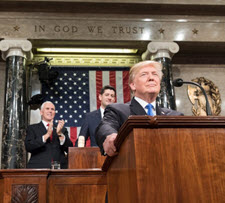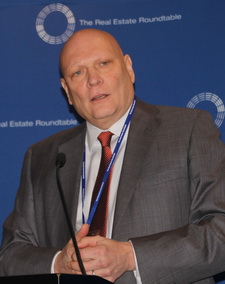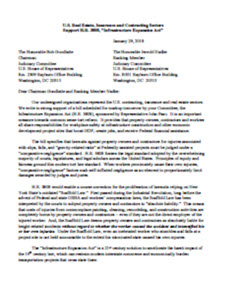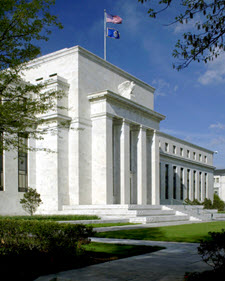In his State of the Union address this week, President Trump called for a bipartisan approach on infrastructure and immigration – policy issues that could define the second year of his Administration before mid-term elections in November.
 |
In his State of the Union address this week, President Trump called for a bipartisan approach on infrastructure and immigration. |
The president's address included a proposed 50 percent increase in infrastructure spending compared to a 1 trillion dollar goal stated earlier. (USA Today, Jan. 5). "Tonight, I am calling on the Congress to produce a bill that generates at least 1.5 trillion dollars for the new infrastructure investment we need. Every federal dollar should be leveraged by partnering with state and local governments and, where appropriate, tapping into private sector investment, to permanently fix the infrastructure deficit," Trump said.
Although the president's comments did not include details about how to fund the infrastructure initiative, he also emphasized the need to reduce the average permitting time for infrastructure projects from 10 years to two – noting that the Empire State Building was built in one year.
Roundtable President and CEO Jeffrey DeBoer commented on the positive economic benefits that such an infrastructure program would bring to the nation. "Modernizing our roads, tunnels, mass transit, drinking water, power grid, and telecommunications systems – in rural and urban areas alike – are vitally important to economic growth, productivity and America's global competitiveness," DeBoer said.
He added, "Real Estate Roundtable members are experienced in addressing the financing, permitting and government partnership issues that frequently slow or stop infrastructure projects. We intend to provide positive feedback and ideas to all policymakers working to facilitate improvements in our nation's infrastructure." (Roundtable Letter on Infrastructure Funding, Jan. 11)
The White House said on Wednesday that it will offer Congress detailed principles on the infrastructure proposal in the coming weeks. (Bloomberg, Feb. 1).
 |
Roundtable President and CEO Jeffrey DeBoer noted that both infrastructure and immigration policies could create more jobs and spur higher wages. |
President Trump also made immigration a key focus of his address, proposing a four-point immigration reform and border security framework. A vote may be held next week in Congress on the Deferred Action for Childhood Arrivals (DACA, or "Dreamers") immigration program.
The Roundable's DeBoer noted that both infrastructure and immigration policies could create more jobs and spur higher wages. "Pro-growth immigration reform that honors our roots as a nation of immigrants and safeguards our nation's security is also critically important to continue the upward trajectory of our economy," DeBoer stated.
Debt Ceiling
Looming over policy debates on Capitol Hill and a Feb. 8 scheduled expiration of government funding is the nation's debt ceiling, which will be reached in March according to reports this week from the Treasury Department and Congressional Budget Office. The debt ceiling allows the government to finance commitments that have already been made — it does not authorize new spending.
Both reports forecast the government will be unable to meet its debt obligations in March. Treasury Secretary Steven Mnuchin on Wednesday urged congressional leaders to "act promptly" to increase the limit. (Reuters, Jan. 31).
Congressional lawmakers are reportedly working on a fifth Continuing Resolution this fiscal year to fund the government through March 23 — it needs to pass next week to prevent another government shutdown. (BNA, Feb. 1)
Legislation aimed at lessening the harsh impact of an antiquated 133 year-old labor "Scaffold Law" – an economic burden on infrastructure projects crossing state lines – passed the House Judiciary Committee on Tuesday. (Committee Mark-up Video, Jan. 30)
 |
The Jan. 29, 2018 industry coalition letter in support of the Infrastructure Expansion Act (H.R. 3808). |
The Infrastructure Expansion Act of 2017 (H.R. 3808), sponsored by Rep. John Faso (R-NY), passed along party lines by a 16-14 vote. The Real Estate Roundtable, Associated General Contractors, and 17 U.S. organizations representing the contracting, insurance and real estate sectors urged the committee to pass the bill. (Coalition Letter, Jan. 29)
The coalition letter provides several examples of transportation projects (such as the Northeast Corridor Gateway Program) that would benefit multiple states and the national economy, yet are hindered by application of the Scaffold Law.
Courts have interpreted the New York law to subject property owners and contractors to "absolute liability" for slips, falls, and height-related accidents that occur during commonplace painting, cleaning, remodeling, and construction activities.
Under this standard, any negligence by a worker that may cause an accident or intensify his own injuries is disregarded. As an example, an inebriated worker who stumbles and falls at a project site would not be held accountable to the extent his intoxicated state caused his own injuries. (Roundtable Weekly, Jan. 19). As a result, absolute liability under the Scaffold Law has caused premiums for general liability insurance at New York development sites to skyrocket.
H.R. 3808 would deny federal funding to construction projects that use New York's "absolute liability" standard for workplace injuries caused by falls. The bill does not diminish or alter Federal or state OSHA obligations, nor does it foreclose "no-fault" workers' compensation.
Committee Chairman Goodlatte (R-VA) broadened the bill's scope to require states use either a "comparative negligence" or "contributory negligence" standard for falls on federally subsidized projects. In a statement, Goodlatte also offered detailed reasons explaining why the legislation should be enacted.
Although the Infrastructure Expansion Act may continue to gain predominantly GOP support in the House, its prospects in the Senate are far more challenging.
Janet Yellen concluded her final meeting as chair of the Federal Reserve on Wednesday after four-years of overseeing a cautious approach to monetary policy at the central bank. The Fed released a statement the same day about positive trends in the national economy, citing information "that the labor market has continued to strengthen and that economic activity has been rising at a solid rate." (Federal Reserve Statement, Jan 31)
 |
The Federal Reserve in Washington, DC |
The Senate on Jan. 23 voted 84-13 to confirm Fed Governor Jerome "Jay" Powell as the next Fed chairman. After the Fed's Federal Open Market Committee (FOMC) this week unanimously affirmed Powell as its chair, he will be sworn into office for a four-year term on Feb. 5.
President Trump now has the opportunity to fill four of seven seats empty on the Fed's board.
Powell is expected to continue monetary policies pursued in the Yellen-era. In December, Ms. Yellen said, "There is strong consensus in the committee for the gradual approach that we've been pursuing, and governor Powell has been part of that consensus." (Wall Street Journal, Jan. 31)
During her tenure, Yellen raised borrowing costs five times since late 2015 and recently initiated a reduction process in the central bank's 4.5 trillion dollar balance sheet. Most economists foresee another interest rate increase when the Fed meets for its next scheduled policy meeting in March under Chairman Powell. (Los Angeles Times, Jan. 31)
Before President Barack Obama appointed him to serve as Fed Governor in 2012, Powell served at the Treasury Department under President George H.W. Bush and served as a managing director at Carlyle Group.